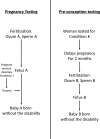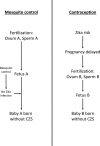Zika, contraception and the non-identity problem
- PMID: 29130262
- PMCID: PMC5698776
- DOI: 10.1111/dewb.12176
Zika, contraception and the non-identity problem
Abstract
The 2016 outbreak of the Zika arbovirus was associated with large numbers of cases of the newly-recognised Congenital Zika Syndrome (CZS). This novel teratogenic epidemic raises significant ethical and practical issues. Many of these arise from strategies used to avoid cases of CZS, with contraception in particular being one proposed strategy that is atypical in epidemic control. Using contraception to reduce the burden of CZS has an ethical complication: interventions that impact the timing of conception alter which people will exist in the future. This so-called 'non-identity problem' potentially has significant social justice implications for evaluating contraception, that may affect our prioritisation of interventions to tackle Zika. This paper combines ethical analysis of the non-identity problem with empirical data from a novel survey about the general public's moral intuitions. The ethical analysis examines different perspectives on the non-identity problem, and their implications for using contraception in response to Zika. The empirical section reports the results of an online survey of 93 members of the US general public exploring their intuitions about the non-identity problem in the context of the Zika epidemic. Respondents indicated a general preference for a person-affecting intervention (mosquito control) over an impersonal intervention (contraception). However, their responses did not appear to be strongly influenced by the non-identity problem. Despite its potential philosophical significance, we conclude from both theoretical considerations and analysis of the attitudes of the community that the non-identity problem should not affect how we prioritise contraception relative to other interventions to avoid CZS.
Keywords: bioethics; empirical ethics; ethics; health priorities; resource allocation.
© 2017 The Authors Developing World Bioethics Published by John Wiley & Sons Ltd.
Figures





References
-
- Dev World Bioeth. 2017 Dec;17(3):173-204 - PubMed
MeSH terms
Grants and funding
LinkOut - more resources
Full Text Sources
Other Literature Sources
Medical

